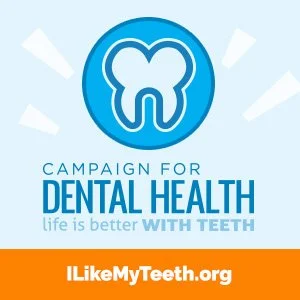November is Diabetes Awareness Month. Good oral health is especially important for people with diabetes, who are 3x more likely to have gum disease. As part of Smile Spokane’s Care Coordination Strategy, Aging and Long Term Care of Eastern Washington connects people with diabetes to oral health providers who take Apple Health Medicaid. Accessing dental services helps people with diabetes manage the health of their mouth.
The Campaign for Dental Health (CDH)
The Campaign for Dental Health (CDH) is a coalition of organizations that support prevention. The CDH was created to ensure that people of all ages have access to the most effective, affordable, and equitable way to protect teeth from decay — community water fluoridation. The coalition and its website are managed by the American Academy of Pediatrics.
Seniors Oral Health
Improving Seniors Oral Health is an initiative of the Arcora Foundation. This website, sponsored by Arcora Foundation, gives you valuable information and resources to maintain a healthy mouth, teeth, and gums – to live a healthier life as the years go by.
Spokane Regional Health District (SRHD) – Oral Health Program
The Spokane Regional Health District Oral Health Program assists individuals and families needing dental services. For those without access to dental insurance, covering the costs of dental visits can be much harder and may result in a decision to avoid going to the dentist. There are cost-saving options available for those seeking assistance with dental health care.
Request for Proposals | Care Coordination Agency
Better Health Together has been awarded a contract as part of the Spokane County Smart Reentry Grant Award – Second Chance Reentry Initiative activities, which aims to provide support to individuals returning to communities from jail. Using the Pathways Community Hub model, this community-based care coordination system will connect Community Health Workers with the justice involved clients to connect them to appropriate behavioral and primary health care, as well as social determinant of health services. Through this structured care coordination model, Care Coordinating Agencies (CCAs), get paid based on the successful outcomes achieved while building client’s self-sufficiency.
The Better Health Together Accountable Community of Health, is initiating this Request for Proposal (RFP) to solicit proposals to enter into an agreement with care coordination agencies to provide direct care coordination services using the Pathways Community Hub Model (Pathways) and Care Coordination Systems (CCS) data/reporting platform.
PROJECT TITLE: Pathways Community Hub Care Coordination Agency
PROPOSAL DUE DATE: October 19, 2018 by 5:00 p.m. Pacific Time
ESTIMATED TIME PERIOD FOR CONTRACT: November 1, 2018 through September 30, 2020
Click here to download the requirements outlined in the RFP and scroll down to view FAQs.
Learn more about Pathways!
BHT is excited to be piloting the Pathways Hub model for Care Coordination in our region. Want to learn more? Check out these videos on the Pathfinder Community Hub:
FAQs
Is the $241,137 for each agency, or is it split between the two agencies? If so, is the $241,137 spread over the two-year period?
The $241,137 is the max grant amount that BHT can bill the County for the 23 months, split between the two agencies. There’s potential that as CCAs are successfully completing Pathways and serving at least 100 clients over the course of 23 months, the amount will exceed the $241,000. In that case, the BHT Board can consider approving use of 1115 Waiver dollars to put toward care coordination.
Are general operating costs for the program expected to be paid for out of the estimated payment schedule?
BHT expects that these funds will cover the staffing of 1 FTE care coordinator and at least .25 FTE supervisor position. We won’t be paying out anything specific toward general operating costs, however, once the outcome-based payments are earned (and in excess of staffing costs), the funds can be spent at the organization’s discretion.
Do the performance-based payments for having a case-load over 20 continue after month 4?
No. After month 4 we’ll distribute only outcome-based payments. The first three months of performance-based payments are to help subsidize while case-loads are being built up.






